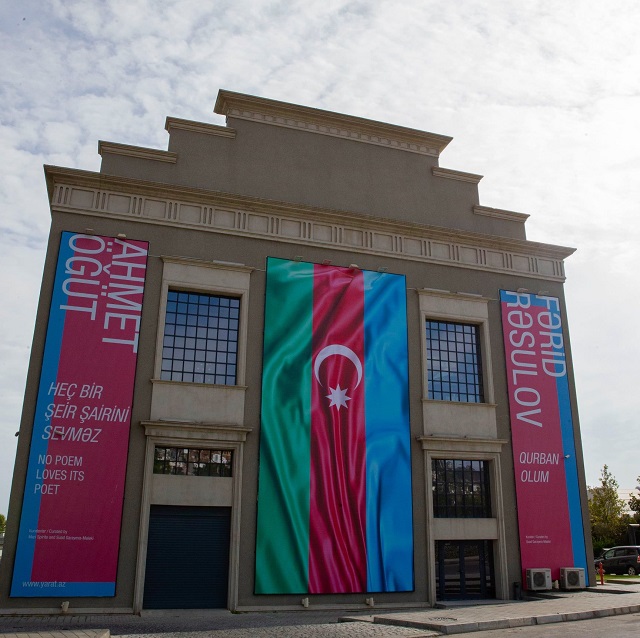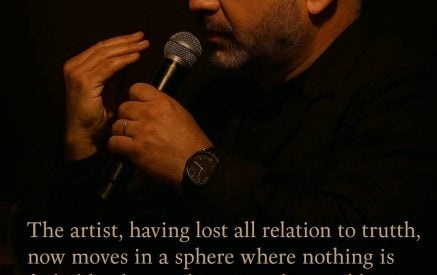By Harut Sassounian
Publisher, The California Courier
Read also
The Calvert Journal published last week an article by Lucía de la Torre titled, “The Aliyev influence: how nepotism and self-censorship rule Azerbaijan’s art scene.”
On October 2, 2020, two days after the start of the Artsakh war, a giant Azerbaijani flag was placed on the façade of Baku’s YARAT Contemporary Art Space gallery with a giant message: “Karabakh is Azerbaijan.”
This did not sit well with the Turkish-born Kurdish artist Ahmet Ogut whose exhibition “No Poem Loves Its Poet” had been displayed in the gallery since May 2020. Ogut requested that the propaganda banner be taken down and boldly declared: “I refuse to allow my work to fall prey to political instrumentalization.”
The gallery refused to remove the banner and closed down Ogut’s exhibit on October 29, 2020, three weeks earlier than scheduled.
According to The Calvert Journal’s article, “This is one example of how Azerbaijan’s apparently thriving art scene conceals something darker: a deeply nepotistic environment which routinely suppresses dissident voices while crafting an international image of Azerbaijan as a free, art-loving nation.”
Artists like Ogut, who refuse to go along with Azerbaijan’s political propaganda, are quickly ostracized and lose all artistic privileges.
Artists worldwide were alarmed by Azerbaijan’s abuse of power, trampling on the rights and independence of an artist. However, this came as no surprise to those who have followed many other violations by the country’s despotic leader. Ruled “by President Ilham Aliyev and Vice-President and First Lady Mehriban Aliyeva, the Azerbaijani government has been repeatedly criticized by human rights’ groups for ongoing censorship, a poor human rights record, and rampant corruption. And, like many nearby authoritarian regimes, members of the President’s family are known to own most of the country’s major businesses, earning them millions of dollars since the fall of the USSR and situating Aliyev amongst the world’s richest oil billionaires,” The Calvert Journal reported.
The YARAT gallery was founded by Aida Mahmudova, an artist, curator, and Vice President Mehriban Aliyeva’s niece. The Marriott Hotel in Baku, “which is allegedly connected to Aliyev’s daughters Leyla and Arzu Aliyeva according to reporters for the Organized Crime and Corruption Reporting Project, is one of YARAT’s main partners,” The Calvert Journal wrote.
“Mahmudova is also the director of another of Azerbaijan’s main contemporary art galleries: Baku’s Museum of Modern Art (MoMa). The museum was founded by Mehriban Aliyeva in 2009, and is funded by the Heydar Aliyev Foundation (of which Mehriban Aliyeva is the President and Leyla Aliyeva the Vice-President), a charitable organization created in memory of the former president of Azerbaijan and father of current president Ilham Aliyev. Elsewhere in Baku, another star venue on Azerbaijan’s cultural scene is the Heydar Aliyev Center. The current director of the Heydar Aliyev Center is Anar Alakbarov, a former assistant to the Vice President of Azerbaijan and current assistant to the President,” The Calvert Journal reported.
Baku has several other smaller art galleries which are controlled by Azerbaijan’s government. “The Qiz Qalasi Gallery, an art venue in Baku with a branch in Berlin, is headed by Emin Mammadov, who also works as Art Curator for the Heydar Aliyev Foundation. ‘Modern Art of Azerbaijan’ is a travelling exhibition supported by the Heydar Aliyev Center that toured European capitals, where Mehriban and Leila Aliyeva hosted lavish inaugurations attended by European government officials and diplomats. In November 2020, the gallery launched ‘Armed with the Arts,’ an exhibition allegedly meant to promote peace after the Second Nagorno-Karabakh war, while, similarly to YARAT, openly supported the position of the Azerbaijani government and used politically-charged, bellicose language. Kicik QalArt Gallery, a project of the ‘Art ex East Foundation’ and another important smaller-scale venue in the capital, although now closed, used to be owned by Olivier Mestelan, a Swiss art collector and financier. Mestelan used to sit on the board of Ataholding, an open joint-stock company that managed Atabank, one of the biggest commercial banks in Azerbaijan, now bankrupt and owned by the Azerbaijan Deposit Insurance Fund (ADIF). According to an investigation carried out in 2011 by Radio Free Europe’s Azerbaijani Service, Mestelan was also claimed to be the treasurer of three offshore Panama-based companies linked to Azerfon, a Baku-based telecommunications company with links to Arzu and Leyla Aliyeva,” The Calvert Journal wrote.
Lesley Gray, a scholar researching the development of the contemporary art scene in the Arab Gulf and Caspian Sea region, explained that Azerbaijan and other countries use contemporary art as a tool to reshape the country’s international image.
Azerbaijan’s leaders are not interested in art for art’s sake. “They hope to use art as a tool to attract international attention for something other than imprisoned journalists and crackdowns on free speech,” The Calvert Journal reported.
The Azerbaijani government has also used its investments in contemporary art around the world to project power and establish goodwill. “Mehriban Aliyeva, through the Heydar Aliyev Foundation, has shelled out generous sums for cultural institutions such as The Palace of Versailles, Paris’ Louvre Museum, and the Vatican Museums, while the Friends of Azerbaijani Culture Foundation, a non-governmental charity which she founded in 1995, routinely organizes art exhibits abroad,” according to The Calvert Journal.
As a result, “in 2004 Mehriban Aliyeva was designated UNESCO Goodwill Ambassador, a laurel given in recognition of her actions to promote international cultural exchanges. Later, in 2010, Aliyeva received a gold medal from UNESCO for her ‘efforts in establishing an intercultural dialogue.’ Over the years, Azerbaijan has had a particularly favorable relationship with the UN body — in October 2015, at the petition of Mehriban Aliyeva, UNESCO hosted an exhibition ironically called ‘Azerbaijan — Land of Tolerance’ at its Paris headquarters. At the opening, when a journalist asked Aliyeva whether the title of the exhibition lived up to the reality in Azerbaijan, considering the country has ‘many political prisoners in jail,’ Aliyeva denied this and turned her back while security guards pushed the journalist away. The relationship was particularly favorable between Mehriban Aliyeva and Irina Bokova, Director-General of UNESCO, 2009-2017. Their relationship came under scrutiny in 2017, when Kalin Mitrev, Bokova’s husband, was investigated by the Bulgarian Chief Prosecutor in relation to media publications about payments made by Azerbaijani companies to his [bank] accounts. Bokova then wrote a letter to The Guardian [newspaper] defending the rightfulness of her relationship with Azerbaijan, but never spoke openly about the money allegedly received by her husband or her stance towards Azerbaijan’s human rights abuses,” The Calvert Journal reported.
However, Azerbaijan’s devious use of the arts was exposed in 2011, when “Azerbaijan censored its own entry to the Venice Biennale, the world’s most high-profile showcase of contemporary art, by hiding the work of one of its own artists under a piece of cloth. Moscow-based artist Aidan Salakhova’s work Waiting Bride, which showed a woman in a black veil from head to foot, and another sculpture, which showed the Black Stone of Mecca contained in a vagina-shaped marble frame, were hidden under a white cloth. The [Azeri] government later claimed that the artworks were ‘damaged during transport’, while senior sources at the exhibition clarified that the works were censored for being considered offensive to Islam,” according to The Calvert Journal.
Nothing is surprising about the exploitation of art by Azerbaijan. A government, whose soldiers cut off the heads and ears of captured Armenians, can easily abuse art to cover up its corruption and gross human rights violations.























































